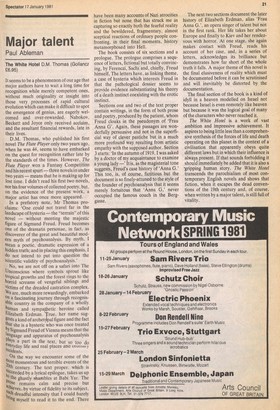Major talent
Paul Ableman
The White Hotel D.M. Thomas (Gollanc2 £6.95) It seems to be a phenomenon of our age that major authors have to wait a long time for recognition while merely competent ones, without much originality or insight into those very processes of rapid cultural evolution which can make it difficult to spot the emergence of genius, are eagerly welcomed and over-rewarded. Nabokov, Beckett and Joyce only received acclaim, and the resultant financial rewards, late in their lives.
D.M. Thomas, who published his first novel The Flute Player only two years ago, when he was 44, seems to have embarked on the quest for recognition rather late by the standards of the times, However, The Flute Player won a Fantasy Competition and his recent spurt — three novels in under two years — means that he is making up for lost time. I didn't read his first two novels, nor his four volumes of collected poetry, but, on the evidence of the present work, a major artist has once more appeared.
In a prefatory note, Mr Thomas proclaims: 'One could not travel far in the landscape of hysteria—the "terrain" of this novel — without meeting the majestic figure of Sigmund Freud. Freud becomes one of the dramatis personae, in fact, as discoverer of the great and beautiful modern myth of psychoanalysis. By myth, I mean a poetic, dramatic expression of a hidden truth; and in placing this emphasis, I do not intend to put into question the scientific validity of psychoanalysis.'
No, we are not off on a safari into The Unconscious where symbols sprout like tropical growths and the forest rings to the horrid screams of vengeful siblings and victims of the dreaded castration complex. We are, much more rewardingly, embarked dd a fascinating journey through recognisable country in the company of a wholly human and sympa letic heroine called Elizabeth Erdman. True, her name suggests a kind of archet pal figure and the fact that she is a hysteric who was once treated ,bY Sigmund Freud of Vienna means that the Language and apparatus of psychoanalysts Plays a part in the text, but so too do veryday life and real places arm oi y Incidents.
On the way we encounter some of the ..,41„Pst momentous and terrible events of the ‘oth century. The text proper, which is !aceeeded by a lyrical epilogue, takes us up `0 the ghastly shambles at Babi Yar. The °rose remains calm arid precise but ae hi eves , by virtue of fidelity to its subject, h dreadful intensity that I could barely ring myself to read it to the end. There have been many accounts of Nazi atrocities in fiction but none that has struck me as capturing so exactly both the fearful reality and the bewildered, fragmentary, almost sceptical reactions of ordinary people confronting, in their final moments, history metamorphosed into Hell.
The book consists of six sections and a prologue. The prologue comprises a sequence of letters, fictional but totally convincing, by Ferenczi, Sachs and, chiefly, Freud himself, The letters have, as linking theme, a case of hysteria which interests Freud in that the pathological dossier seems to provide evidence substantiating his theory of a death instinct coexisting with the erotic instinct.
Sections one and two of the text proper contain writings, in the form of both prose and poetry, produced by the patient, whom Freud cloaks in the pseudonym of 'Frau Anna G'. Again, these passages are wonderfully persuasive and not in the superficial way of clever pastiche but in a much more profound way resulting from artistic empathy with the supposed author. Section 3 starts: 'In the autumn of 1919, I was asked by a doctor of my acquaintance to examine a young lady—' It is, as the magisterial tone suggests, Freud's case history of 'Anna G.' This too, is, of course, fictitious but the document is so finely-attuned to the style of the founder of psychoanalysis that it seems merely fortuitous that 'Anna G,' never occupied the famous couch in the Berggasse, The next two sections document the later history of Elizabeth Erdman, alias 'Frau Anna G.', an opera singer of talent but not in the first rank. Her life takes her about Europe and finally to Kiev and her rendezvous with horror. At one stage, she again makes contact with Freud, reads his account of her case, and, in a series of letters, acknowledges its brilliance but demonstrates how far short of the whole truth it falls. A major theme of this novel is the final elusiveness of reality which must be documented before it can be scrutinised and will inevitably be distorted by the documentation.
The final section of the book is a kind of idyll in a heaven modelled on Israel not because Israel is even.remotely like heaven but because it was the logical goal of many of the characters who never reached it.
The White Hotel is a work of vast ambition and impressive achievement. It aspires to being little less than a comprehensive synthesis of the forces of life and death operating on this planet in the context of a civilisation that apparently obeys quite different laws but in which their influence is always present. If that sounds forbidding it should immediately be added that it is also a 'gripping human story. The White Hotel transcends the parochialism of most contemporary English novels and shows that fiction, when it escapes the dead conventions of the 19th century and, of course, when written by a major talent, is still full of vitality.


































 Previous page
Previous page